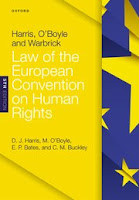‘would such a system be efficient, would it be so outside certain exceptional situations (such as when a government is persistently refusing to fulfil its obligation to abide by a judgment)? Would, furthermore such a system be at all appropriate when the execution of the judgment requires the adoption of general measures, notably legislative ones, which may require lengthy procedures at the national level?’
Friday, 31 March 2023
Wishes for Reykjavik
Tuesday, 28 March 2023
New Edition of 'Law of the European Convention on Human Rights'
- Critically examines the substantive content of each of the basic rights of the Convention and successive Protocols, as well as explaining the history and likely development of the law
- Sets the Convention in its international context by examining its relationship with national and European Union law
- Fully explores the extent of the Convention's influence on the legal development of the contracting states, and reveals exactly how such a powerful authority has been achieved and maintained''
Thursday, 23 March 2023
The Hague Civil Society Declaration on Council of Europe Reform
Wednesday, 22 March 2023
Webinar on Climate Change and the ECHR
Tuesday, 14 March 2023
Summer School on Council of Europe
'Europe is at the crossroads. Its future, its stability, and prosperity depend on how effectively it will respond to the crucial – old and new – challenges that it is facing. This summer school will bring together key decision-makers from the Council of Europe and leading scholars to discuss the ways in which the Council of Europe system can stand up to these challenges. These include rising illiberal democracies, the Russian aggression against Ukraine, and the consequent expulsion of the Russian Federation from the Council of Europe, but also climate change, public health emergencies, such as the one caused by COVID-19, and economic crises. The outcomes of the Summits of Heads of State and Government of the Council of Europe in Reykjavik, Iceland will also be discussed.'
Monday, 13 March 2023
New Issue ECHR Law Review
*Robert Spano, 'Primus Inter Pares, but More Pares than Primus! – Recollections of a Former President of the European Court of Human Rights'
*Mathieu Leloup, 'Not Just a Simple Civil Servant: The Right of Access to a Court of Judges in the Recent Case Law of the ECtHR'
*Alessio Sardo, 'Hate Speech: A Pragmatic Assessment of the European Court of Human Rights’ Jurisprudence'
*Daria Sartori, 'Stevie Martin, Assisted Suicide and the European Convention on Human Rights'
Thursday, 9 March 2023
Webinar on the Future of the European Court of Human Rights
The first webinar of the "Road to Reykjavik" series will address these issues, starting with a keynote speech by Professor Angelika Nußberger, a former European Court of Human Rights judge. After her lecture, our discussants, Anastasija Kaplane, LL.M, representing the Riga Graduate School of Law and Filip Cyuńczyk, Ph.D. / Assistant Professor from SWPS University's Faculty of Law in Warsaw will provide critical commentaries. The meeting will be moderated by Professor Adam Bodnar, a renowned expert on human rights and Dean of the Faculty of Law in Warsaw.''








